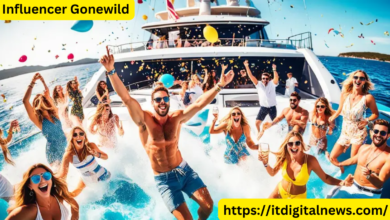The digital age has transformed the way people interact, consume content, and even define success. With the rise of social media platforms, influencers have emerged as key players in shaping trends, marketing products, and entertaining audiences. They have built careers based on their ability to engage followers, create compelling content, and establish personal brands. However, as influencer culture continues to evolve, controversies and challenges arise, leading to discussions about the ethics, responsibilities, and consequences of this modern phenomenon.
The Concept Behind Influencergonewild
Influencergonewild is a term that has gained traction in online discussions, highlighting instances where influencers have behaved in controversial, unexpected, or even reckless ways. It represents a shift in public perception, showcasing the blurred lines between curated online personas and real-life behavior. Whether it involves social media scandals, InfluencerGoneWild extravagant lifestyle displays, or ethical dilemmas, the concept sheds light on the pitfalls of influencer culture.
The Pressure of Maintaining an Online Persona
One of the significant reasons influencers find themselves in controversial situations is the immense pressure to maintain an online persona. Social media platforms reward engagement, and influencers often feel compelled to create content that garners attention, whether through shocking statements, bold actions, or risky stunts. The pressure to stay relevant leads to situations where influencers push boundaries, sometimes crossing ethical or legal lines.
Scandals and Their Impact on Influencers
Social media has made it easier for people to share opinions, and influencers are under constant scrutiny. A single misstep can lead to widespread backlash, loss of sponsorships, and even legal consequences. Scandals involving influencers often revolve around misleading advertisements, cultural appropriation, inappropriate behavior, or financial fraud. When these issues come to light, the internet reacts swiftly, often leading to public apologies, cancellations, or damaged reputations.
The Role of Social Media in Influencer Controversies
Social media plays a significant role in amplifying influencer scandals. Platforms like Twitter, Instagram, and TikTok allow information to spread rapidly, making it difficult for influencers to control narratives once controversies arise. Hashtags, viral videos, and online discussions contribute to the rapid escalation of situations, sometimes resulting in long-term consequences. While some influencers manage to recover, others struggle to regain public trust.
Ethical Concerns in Influencer Marketing
As influencer marketing continues to grow, ethical concerns become more prevalent. Audiences expect authenticity, but many influencers engage in deceptive practices, such as promoting products they do not use, fabricating stories for engagement, or hiding paid promotions. Regulatory bodies have stepped in to enforce transparency, requiring influencers to disclose sponsorships and partnerships. Despite these regulations, instances of unethical marketing persist, fueling discussions about accountability in the influencer industry.
The Fine Line Between Entertainment and Exploitation
In the quest for viral content, influencers often walk a fine line between entertainment and exploitation. Some create prank videos that cross ethical boundaries, while others involve their families or children in content that raises privacy concerns. The desire to gain followers and monetization opportunities sometimes leads to questionable decision-making, sparking debates about responsible content creation.
The Audience’s Role in Influencer Culture
Audiences play a crucial role in influencer culture, as engagement determines success. The demand for shocking, dramatic, or controversial content fuels the actions of influencers. When followers reward risky behavior with likes, shares, and comments, it encourages more extreme content creation. However, audiences also have the power to hold influencers accountable by calling out inappropriate behavior, demanding transparency, and choosing to support ethical creators.
The Impact of Cancel Culture on Influencers
Cancel culture has become a defining aspect of modern social media, with influencers frequently facing public backlash for their actions. While some argue that cancel culture promotes accountability, others believe it can be overly harsh, leaving little room for growth or redemption. Some influencers manage to make comebacks through genuine apologies and changed behavior, while others struggle to recover from the damage caused by online criticism.
Strategies for Influencers to Maintain Credibility
To avoid falling into the pitfalls of influencer culture, many creators adopt strategies to maintain credibility and authenticity. Transparency, ethical marketing, and responsible content creation are key factors in building a sustainable career. Engaging with audiences in meaningful ways, admitting mistakes, and staying true to personal values help influencers foster trust and longevity in their careers.
The Future of Influencer Culture
As social media continues to evolve, so will InfluencerGoneWild. The rise of AI-generated content, virtual influencers, and stricter regulations may reshape the landscape. Audiences are becoming more aware of manipulative tactics, demanding more accountability and authenticity from content creators. The industry is likely to see shifts towards sustainable, ethical, and more transparent practices as influencers adapt to changing expectations.
Conclusion
Influencergonewild serves as a reminder of the complexities of influencer culture. While social media offers opportunities for creativity, fame, and financial success, it also presents challenges that can lead to ethical dilemmas, scandals, and public scrutiny. Understanding the dynamics of influencer behavior, audience influence, and social media accountability is crucial for navigating this ever-changing digital landscape. As the industry grows, responsible content creation and ethical engagement will define the future of influencers and their impact on society.






